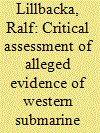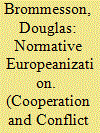| Srl | Item |
| 1 |
ID:
077427


|
|
|
|
|
| Publication |
2007.
|
| Summary/Abstract |
The story of how conflict prevention became an integral and legitimate part of Swedish foreign policy illustrates the relationship between successful practices and powerful ideas. This article suggests that the demonstration of an idea in practice empowers the idea and contributes not only to its selection, but also to its framing and institutionalization within foreign policy. Hence, the article sets out to explore the relationships between practice, ideas and foreign policy. Adopting a social constructivist perspective, the article provides a detailed process-tracing of the construction of a Swedish conflict prevention policy and concludes that conflict prevention was a powerful idea because it was morally appealing and persuasive as well as successfully demonstrated in practice. In fact, preventive practices spearheaded the advancement of the conflict prevention idea. In addition, the idea resonated with the Swedish foreign policy elite, with commonly held values and with the traditional Swedish foreign policy that stressed internationalism and solidarity
|
|
|
|
|
|
|
|
|
|
|
|
|
|
|
|
| 2 |
ID:
141630


|
|
|
|
|
| Summary/Abstract |
The submarine intrusions in Swedish territorial waters in the 1980s have received extensive attention. According to one theory, after the incident in 1981 when a Soviet submarine ran aground close to a Swedish naval base, Western submarines conducted subsequent intrusions as a psychological operation to affect Swedish foreign policy. In support of such claims, submarine observations and interviews with high-ranking Western officials have been put forth. However, the proposed evidence presented in Ola Tunander's article ‘Subs and PSYOPs’ in Intelligence and National Security can either be refuted or is inconclusive.
|
|
|
|
|
|
|
|
|
|
|
|
|
|
|
|
| 3 |
ID:
097796


|
|
|
|
|
| Publication |
2010.
|
| Summary/Abstract |
In this article, the concept Normative Europeanization is developed from a synthesis of Normative Power Europe (NPE) and Europeanization. It is argued that NPE has focused too narrowly on the external relations of the European Union (EU), while Europeanization has focused on changes in policy structures. The synthesis developed here overcomes these shortcomings by emphasizing normative internal relations within the EU. Normative Europeanization is defined as a top-down process based on the logic of appropriateness, where states with a close relationship to the EU, i.e. candidate and member states, develop a commitment to a European centre and their normative point of departure is changed. It is argued here that a process of normative Europeanization affects candidate countries and new EU members especially where pro-European norms are diffused through different mechanisms. The theoretical argument is illustrated through a case study on Swedish foreign policy reorientation during the 1990s. The empirical analysis is structured around two ideal types: internationalist foreign policy and normatively Europeanized foreign policy. Based on this analysis, it is concluded that Swedish foreign policy has undergone strong normative Europeanization.
|
|
|
|
|
|
|
|
|
|
|
|
|
|
|
|